U.S. Inflation Rises First time in 12 Months, but Underlying Measures Mild

Hawaii on fire | A ‘creative’ farm bill | Food prices on the rise | ‘Humanitarian corridor’ in Black Sea
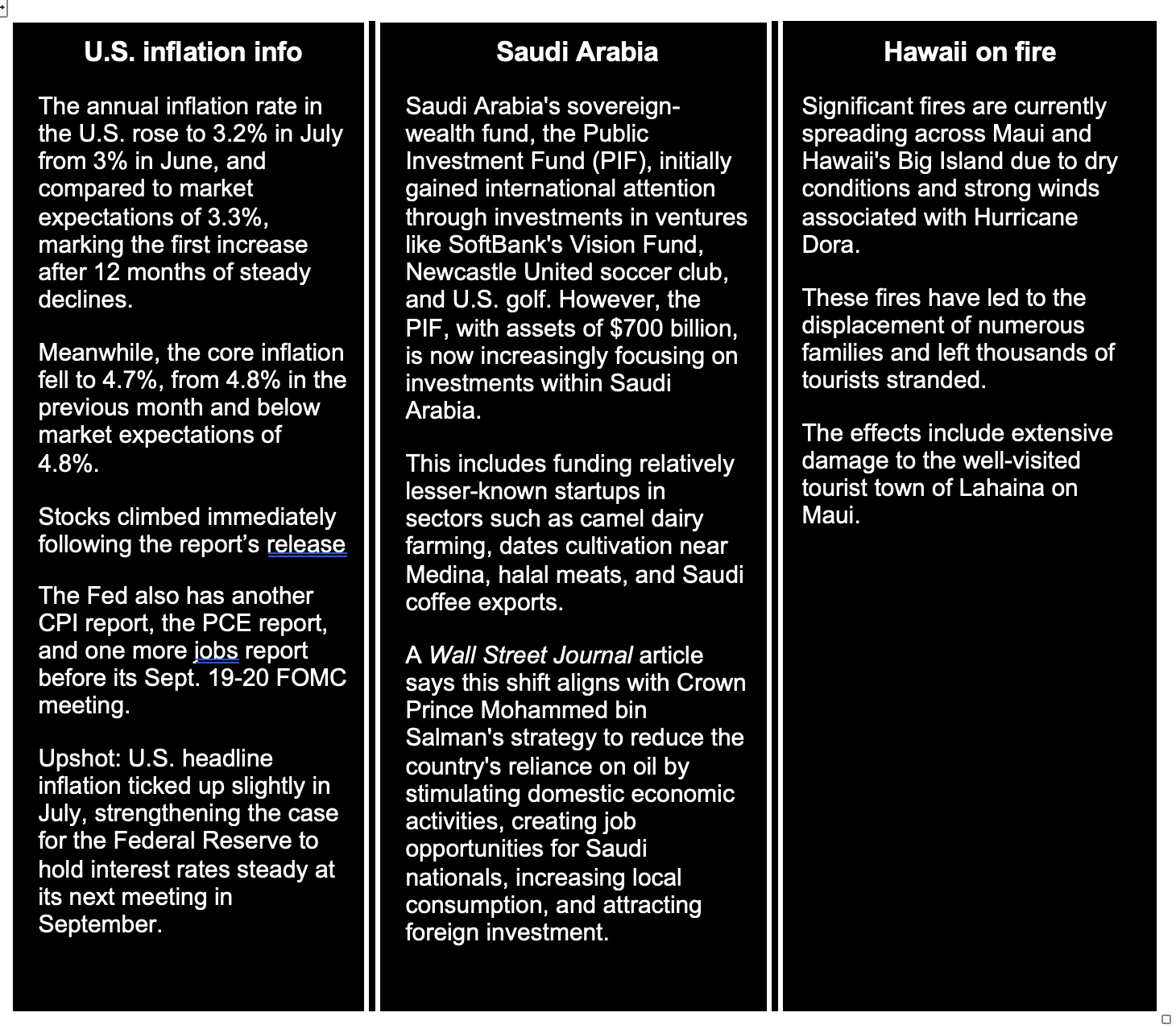
|
In Today’s Digital Newspaper |
China major new-crop soybean buyer. USDA weekly Export Sales figures for the week ended Aug. 3 confirmed China’s hefty purchases of U.S. soybeans. Activity for China for 2023-24 included net sales of 753,000 metric tons of soybeans, 18,000 metric tons of sorghum, and 154,139 running bales of upland cotton. Net sales of 200 metric tons of corn and 15,289 running bales of upland cotton were reported for 2022-23. Sales activity for 2023 included net sales of 2,369 metric tons of beef and 3,019 metric tons of pork.
Inflation in the U.S. rose in July after 12 straight months of declines, boosted by costlier housing. But excluding volatile food and energy prices, so-called core inflation matched the smallest monthly increase in nearly two years. The July inflation figure remained far below last year’s peak of 9.1%, though still above the Federal Reserve’s 2% target. Details below.
Consider this relative to “tame” U.S. inflation: Disney announced price increases to its streaming services for the second time in nearly a year. The monthly costs of subscriptions to Disney+ and Hulu will rise by over 20%.
President Joe Biden introduced restrictions on American investments in China, as part of a larger effort to curtail China's advancement in advanced military and surveillance technologies. While specific details are yet to be finalized, initial signals suggest that the more cautious approach has prevailed in these deliberations.
Analysts are warning of heightened volatility in global food prices due to a convergence of unprecedented threats, the New York Times reports. More in Food section.
The Ukrainian navy introduced a temporary "humanitarian corridor" in the Black Sea, which is now operational and expected to be used by the first ships in the coming days. Details in Russia & Ukraine section.
Russian grain exports in 2023 will be 55 million metric tons (MMT), according to a report from Interfax quoting Russian Agriculture Minister Dmitry Patrushev.
China’s northeastern grain belt is bracing for more rains and flooding from Typhoon Khanun, as producers struggle to recover from impacts of Typhoon Doksuri. More in China section.
In the Policy section, we have some inside news about the new farm bill.
The Washington Post reports that Gina McCarthy is joining America Is All In to help boost awareness of the Inflation Reduction Act. More in Personnel section.
As China goes… The recent decline in global trade, highlighted by decreases in Chinese exports and U.S. imports, primarily mirrors a period of sluggish worldwide economic expansion, the Wall Street Journal reports. More in Trade Policy section.
Wynnewood Refining Co., an Oklahoma-based crude oil refinery, is contesting the Environmental Protection Agency's (EPA) rejection of its request for a small refinery exemption under the RFS program for the 2022 compliance year.
General Motors introduced an all-electric version of its Cadillac Escalade luxury SUV. The 2025 Cadillac Escalade IQ is expected to have a starting price of around $130,000. The vehicle features a prominent 55-inch LED screen on its dashboard.
Blackstone Inc. raised $7.1 billion for its Blackstone Green Private Credit Fund III, exceeding its $6 billion target. This fund is dedicated to financing companies in the solar, electric car parts, and carbon emissions reduction sectors. More in Energy & Climate Change section.
USDA Secretary Tom Vilsack has sent a letter to Brazilian Minister of Agriculture Carlos Fávaro regarding concerns about Brazil's animal disease testing procedures. More in Livestock section.
Presidential candidates will flock to the 11-day Iowa State Fair.
Sen. Dianne Feinstein (D-Calif.), 90, was briefly hospitalized after falling in her home in San Francisco. She returned to her residence after an examination showed no serious injuries, her spokesman said.
North Korean leader Kim Jong Un has given a strong directive to his military commanders to be fully prepared for war, as reported by the state media.
Wildfires swept through Maui, resulting in the deaths of at least 36 individuals and necessitating the evacuation of numerous residents and tourists. While the fires are now largely under control, some people managed to escape the flames by seeking refuge in the ocean. The coastal town of Lahaina, once Hawaii's royal capital, suffered extensive damage, described as being "almost totally burnt to the ground" by Sen. Brian Schatz (D-Hawaii). The fires have been exacerbated by hurricane winds from the Pacific. Dangerous conditions have combined to make the wildfires particularly damaging, including high winds, low humidity and dry vegetation. Officials said 271 structures were damaged or destroyed.
|
MARKET FOCUS |
Equities today: Asian and European stock markets were mixed to firmer in overnight trading. U.S. Dow opened around 190 points higher and then further rallied to just over 300 points higher. In Asia, Japan +0.9%. Hong Kong +0.2%. China +0.3%. India -0.5%. In Europe, at midday, London -0.1%. Paris +0.8%. Frankfurt +0.4%.
U.S. equities yesterday: All three major indices registered losses again Wednesday, with the Dow down 191.13 points, 0.54%, at 35,123.36. The Nasdaq declined 162.31 points, 1.17%, at 13,722.02. The S&P 500 fell 31.67 points, 0.70%, at 4,467.71.
Disney announced price increases to its streaming services for the second time in nearly a year. The monthly costs of subscriptions to Disney+ and Hulu will rise by over 20%. The firm will also crack down on password-sharing. Bob Iger, Disney’s chief executive, acknowledged the company faces a “challenging environment” in the near term. Disney is aiming to become profitable again in 2024.
Agriculture markets yesterday:
- Corn: December corn fell 4 1/2 cents to $4.94 1/4, ending near the session low.
- Soy complex: November soybeans rose 2 1/2 cents to $13.08 1/2 and nearer the session low. September soybean meal fell $5.60 at $412.70 and near the session low. Prices hit a three-week-low. September bean oil rose 23 points to 64.21 cents and closed near mid-range.
- Wheat: December SRW fell 19 3/4 cents to $6.61 3/4, settling near the session low. December HRW fell 5 1/2 cents before settling at $7.76, nearer the session low. December spring wheat closed 10 cents lower at $8.35 1/2.
- Cotton: December cotton rose 15 points to 85.35 and closed nearer the session high.
- Cattle: Expiring August live cattle futures rose 87.5 cents to $180.575 Wednesday, while most-active October gained 80 cents to $181.70. October feeder futures advanced 92.5 cents to $252.15.
- Hogs: October lean hogs led the complex lower, falling $3 to $81.575. Meanwhile, expiring August futures fell 45 cents to $101.65.
Ag markets today: Soybean futures extended gains from the two previous days during overnight trade, while corn and wheat rebounded amid corrective buying. As of 7:30 a.m. ET, corn futures were trading mostly 2 cents higher, soybeans were 8 to 9 cents higher, SRW wheat was 3 to 4 cents higher, HRW wheat was 8 to 9 cents higher and HRS wheat was 6 to 7 cents higher. Front-month crude oil futures were around 50 cents lower, and the U.S. dollar index was down about 350 points.
Market quotes of note:
- Risks of economic downturn. According to Joost van Leenders, a senior investment strategist at Van Lanschot Kempen, the spreads of high-yield corporate bonds do not accurately account for the potential risks of an economic downturn. He suggests that the negative scenario of slowed growth and high inflation has only been partially factored into these spreads. In the U.S., spreads are currently lower than the five-year average, and in the eurozone, they're only slightly above the average by about 5 basis points. Van Lanschot Kempen expresses concerns about high-yield credit due to reduced earnings growth and an elevated default rate, noting that the spreads fail to capture the risk for businesses when they need to refinance bonds at higher interest rates. As a result, the wealth manager maintains a pessimistic outlook for both high-yield and investment-grade credit.
- Why Fitch’s downgrade matters. Fitch Ratings recently downgraded the U.S. credit rating, a move that has been previously dismissed as insignificant due to past instances of downgrades. However, the Wall Street Journal notes (link) the rise in bond yields following this downgrade indicates that it's worth paying attention to. It says this downgrade, along with others, highlights the significant change in the nation's fiscal circumstances. The main concern is that deficits and interest rates could create a feedback loop, leading to negative effects on economic growth and increased costs for both taxpayers and the economy.
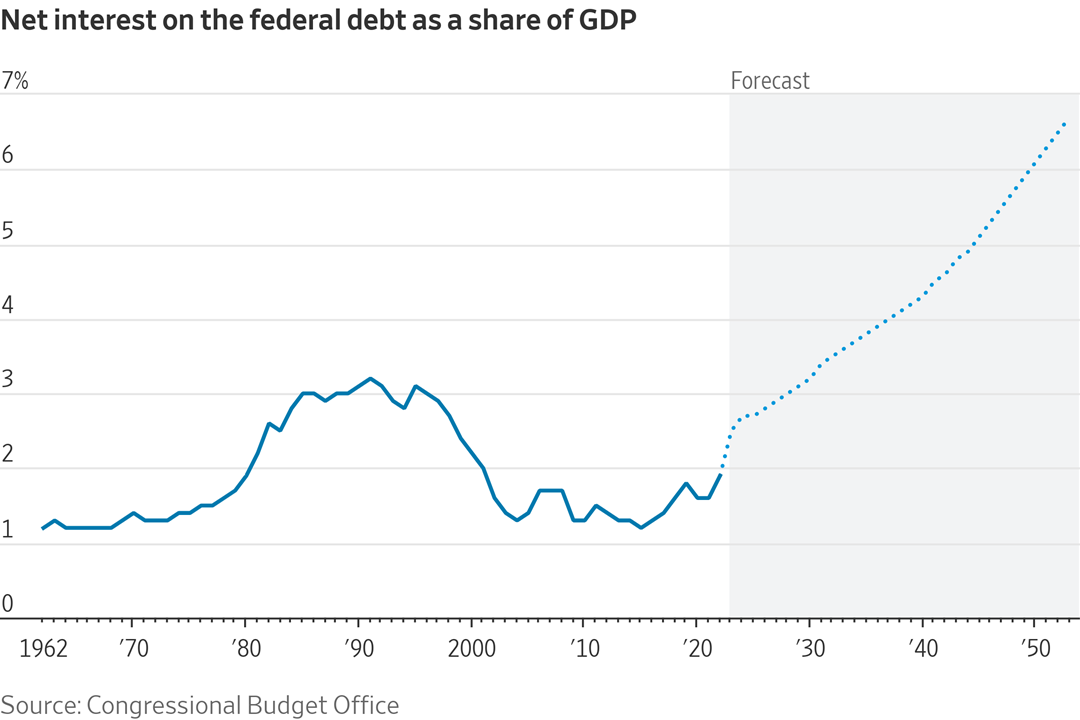
- Consumers not upbeat about U.S. economy. Omair Sharif of Inflation Insights said in a research note: “Most of what people spend their money on continues to go up in price, perhaps explaining why consumers' aren't as optimistic as economists about the recent disinflationary data.”
July consumer prices gained 3.2% on an annual basis, less than the 3.3% consensus from economists. On a month-to-month basis, inflation increased 0.2%, in-line with estimates. The report also said real average weekly earnings were unchanged last month in another positive sign.
Shelter costs were the biggest driver of price increases, contributing to more than 90% of July price growth, according to the data. The index for motor vehicle insurance was also a big contributor.
Almost all of the monthly inflation increase came from shelter costs, which rose 0.4% and were up 7.7% from a year ago. The BLS said more than 90% of the increase came from that category, which accounts for about one-third of the CPI weighting.
Food prices increased 0.2% on the month, and the BLS said energy increased just 0.1% even though crude prices surged during the month and prices at the pump jumped as well.
Used vehicle prices declined 1.3% and medical care services were off 0.4%.
The comparatively tame inflation levels helped raise worker pay. Real wages increased 0.3% on the month and were up 1.1% from a year ago, the BLS said.
Excluding food and energy costs, prices rose 4.7% annually, from 4.8% in the previous month and below market expectations of 4.8%.
Economists say the bump is linked to temporary factors — including rebounding airline, hotel and energy prices — that are not likely to erode longer-term progress. The overall number was also higher because prices are being compared to the rates of increase last July, the first month when inflation began to fall after a long climb.
Food inflation, July 2023 vs July 2022:
- Ground beef: +3.1%
- Bacon: -10.7%
- Eggs: -13.7%
- Apples: +7.5%
- Fish & seafood: -0.8%
- Bread: +9.5%
- Pork: -3.7%
- Milk: -3.0%
- Rice: +6.5%
- Coffee: +1.0%
- Butter: -1.1%
- Chicken: -2.5%
- Lettuce: +6.6%
- Cheese: -0.3%
- Soups: +3.7%
- Tomatoes: +2.0%
- Cakes & Cookies: +6.9%
- Ice Cream: +6.3%
- Potatoes: +4.4%
- Bananas: Unchanged
- Oranges: -3.6%
- Fats & Oils: +6.3%
- Cereal: +5.8%
- Ham: +5.7%
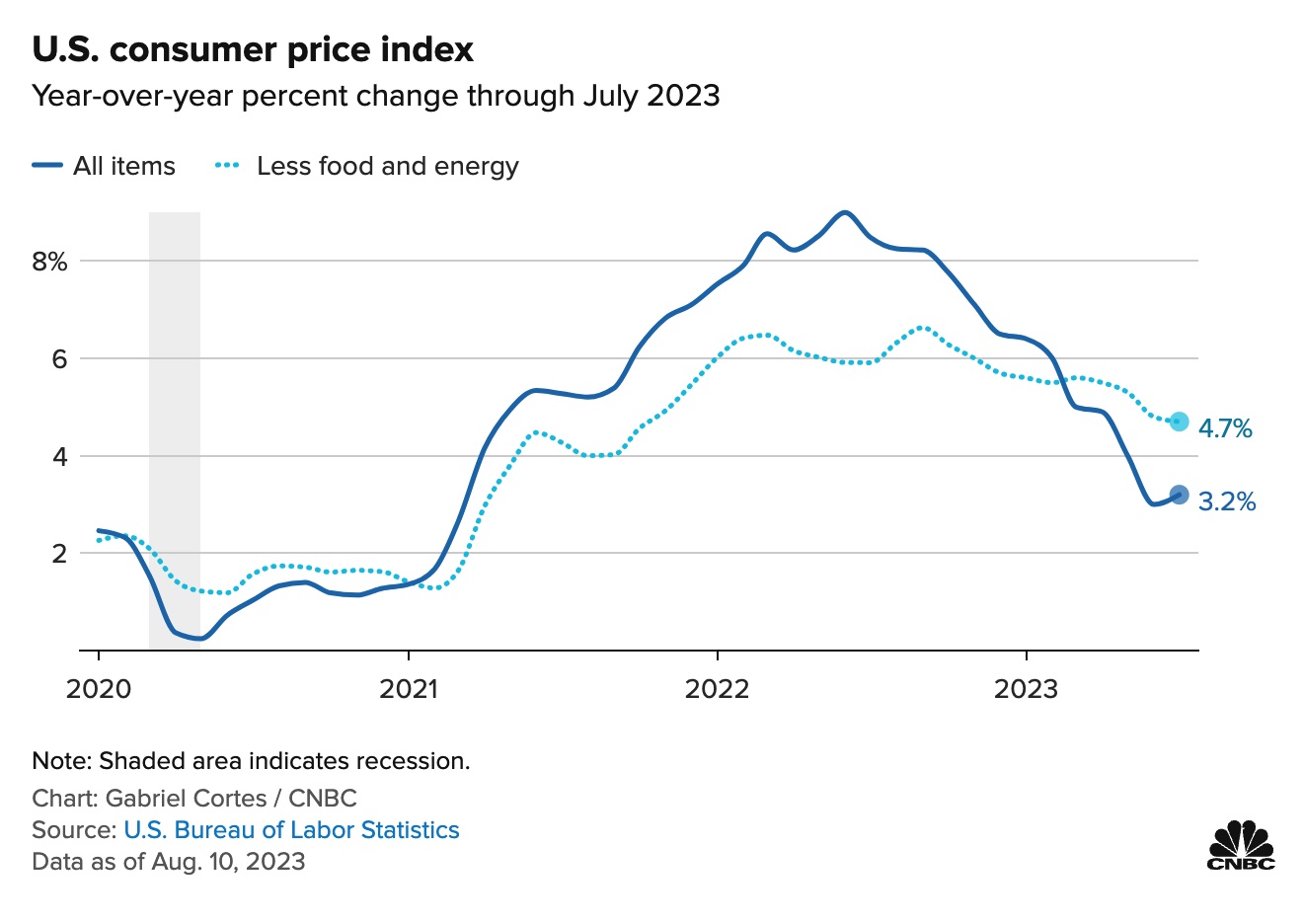
Headline U.S. inflation has decreased from a yearly peak of 9.1% in June 2022 to 3% in the current June. Core inflation, which excludes energy and food costs, has also dropped from a peak of 6.6% in September to 4.8%. Both measures are expected to have a relatively modest monthly increase of 0.2%, the second such rise in core inflation, representing the smallest back-to-back monthly gains in over two years.
Upshot: These projected numbers align with an annualized rate close to the Federal Reserve's target of 2%, although year-on-year metrics might take some time to reach that level. These trends suggest that the Federal Reserve might have accomplished its objectives. Nonetheless, unexpected changes, particularly in core inflation, could potentially lead the central bank to consider further tightening measures.
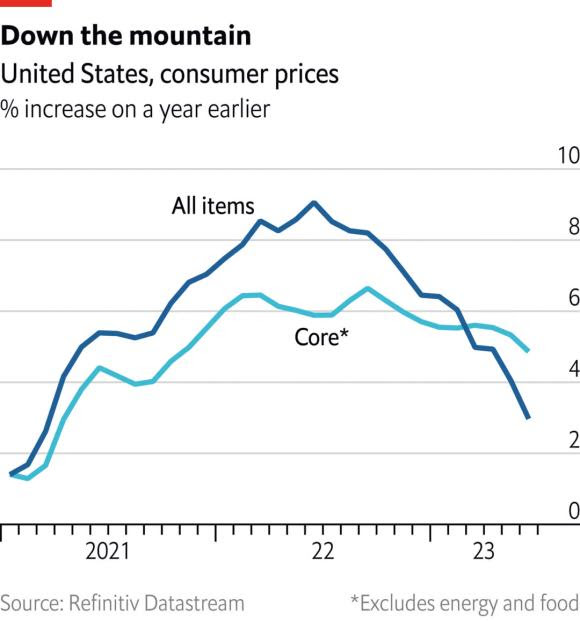
Market perspectives:
• Outside markets: The U.S. dollar index was weaker ahead of U.S. inflation data, with the euro, yen and British pound all firmer against the greenback. The yield on the 10-year U.S. Treasury note eased to around 3.98% ahead of the CPI report, with a mostly higher tone in global government bond yields. Crude oil futures were under pressure, with U.S. crude around $83.75 per barrel and Brent around $87.05 per barrel. Gold and silver were higher ahead of inflation figures, with gold around $1,955 per troy ounce and silver around $22.86 per troy ounce.
• Gas prices are up about 30 cents per gallon compared to a month ago, according to AAA. And while Wednesday’s average price of $3.83 is substantially lower than the $4.03 that Americans were paying a year ago, that’s a dollar-plus more than during an August road trip pre-pandemic.
• Weather whiplash confounds Kansas wheat crop. The New York Times writes that, “At a time when the global grain market has been scrambled by a war between two major wheat producers, Ukraine and Russia, farmers in Kansas are bringing in the state’s smallest wheat crop in more than half a century.” Link to article.
• Ag trade: South Korea purchased 66,000 MT of corn expected to be sourced from the U.S., South America or South Africa. Japan purchased 93,972 MT of milling wheat in its weekly tender, including 25,998 MT of U.S. and 67,974 MT of Canadian. Tunisia tendered to buy 25,000 MT of optional origin soft milling wheat.
• A series of wildfires in Hawaii resulted in the deaths of at least 36 individuals, as confirmed by local authorities. The fires were intensified by strong winds from a distant hurricane, causing significant damage to Maui, including the tourist town of Lahaina. Therefore, numerous residents had to evacuate, with some resorting to seeking refuge in the ocean to escape the smoke. More than 2,100 spent the night in emergency shelters while another 2,000 sheltered at Kahului Airport. This summer has witnessed severe weather conditions globally.
• NWS weather outlook: Dangerous heat will persist across much of the southern tier of the U.S... ...Severe thunderstorms possible today across the Carolinas while heavy rain could impact southern New England tonight... ...Rounds of strong to severe thunderstorms expected for the upper Midwest to the Great Lakes from late Thursday through early Saturday.
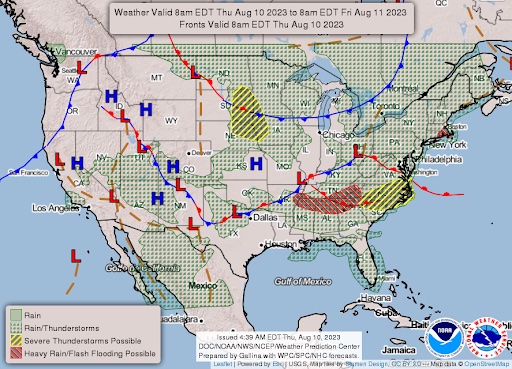
Items in Pro Farmer's First Thing Today include:
• Grains firmer overnight
• Exchange expects big rebound in Argentine soybean, corn crops
• Strategie Grains expects EU wheat production to fall below year-ago
• Fire at French port under control, but operations suspended
• China continues cotton sales
• Choice beef finding support just above $300
• Cash hog fundamentals continue to weaken
|
RUSSIA/UKRAINE |
— Ukraine's Zaporizhia nuclear plant is at risk of a blackout as it lost connection to its main external power source, according to the national nuclear authority. Separately, an unconnected missile attack in Zaporizhia city, attributed to Russia, caused casualties, with two people dead and nine injured. Meanwhile, Russia's defense ministry claimed to have intercepted and shot down multiple drones, including those approaching Moscow and near Crimea.
— President Biden is seeking $25 billion in new funding for Ukraine, according to reports, setting up a possible showdown with Republicans.
Of note: The request will include about $12 billion for U.S. disaster relief and $13 billion for defense funds.
— The Ukrainian navy introduced a temporary "humanitarian corridor" in the Black Sea, which is now operational and expected to be used by the first ships in the coming days. This corridor is designed for cargo vessels and is characterized by transparency, with ships equipped with cameras to demonstrate its purely humanitarian nature.
The corridor is particularly aimed at cargo vessels not covered by the Black Sea grain deal. Routes have been proposed to the International Maritime Organization (IMO) and will be primarily used for civilian ships that have been in Ukrainian ports since Russia's invasion in February 2022. Ships meeting readiness conditions will be allowed to pass through these routes.
However, the Ukrainian navy has also highlighted ongoing threats from Russian mines and the potential for military actions in the Black Sea.
— Russian grain exports in 2023 will be 55 million metric tons (MMT), according to a report from Interfax quoting Russian Agriculture Minister Dmitry Patrushev. “This year we plan to export, taking into account our plans for the harvest, about 55 million tonnes. This figure can be adjusted upwards. If we see that our forecasts for grain volumes are growing, we will adjust the figure for export volumes,” Patrushev said.
|
POLICY UPDATE |
— New farm bill update:
- Timing: House Ag Chair. G.T. Thompson (R-Pa.) previously said he plans to circulate a draft in early September, with a possible panel markup by mid-September. But he may push those plans back depending on when he can secure floor time. The Senate signals their farm bill draft won’t be ready until October at the earliest, but Sen. Amy Klobuchar (R-Minn.) this week said the Senate will likely go before the House regarding a vote on a new farm bill.
- House GOP hardliners: Reports note meetings have taken place intraparty to make sure there will not be a similar push-and-pull scenario whenever House leaders decide to vote on the omnibus measure. But some hardline GOP conservatives are already questing the farm bill price tag estimated at $1.51 trillion over ten years. The GOP mavericks also want further policy changes for the food stamp program, something Thompson is trying to avoid.
- This farm bill like most others will be a blend of policy and politics. For example, if efforts to boost reference prices fail, lawmakers like Sen. John Boozman (R-Ark.) will be pressed to pull their support for the measure.
- Key word for this farm bill debate: creative. That is the word several lawmakers have used recently relative to funding constrains in improving some features of the farm bill, especially the Title I safety net programs. That appears to be the case with ongoing staff and lawmaker work regarding possible changes relative to updating acreage bases, which could lead to some savings to be moved elsewhere.
- Sources signal to watch for farm bill changes to improve ag insurance programs, for both crops and livestock.
|
PERSONNEL |
— Washington Post: Gina McCarthy is joining America Is All In to help boost awareness of the Inflation Reduction Act. McCarthy, former national climate adviser to President Biden and ex-head of the EPA under President Obama, is joining the climate initiative "America Is All In" as managing co-chair, the WaPo reports (link). This move aims to address the challenge of increasing public awareness about the Inflation Reduction Act, a key climate law, which is currently unfamiliar to many Americans. McCarthy's role in the initiative involves promoting federal actions and supporting climate efforts among subnational leaders such as mayors, governors, tribal leaders, and corporate executives. "America Is All In" is co-chaired by Mike Bloomberg, Gov. Jay Inslee, and Mayor Vi Lyles. McCarthy, who brings decades of experience in government and environmental leadership, plans to spread awareness about clean energy incentives through events across various cities, including Orlando and Columbus.
“I’ve been in government for 44 years, even though I don’t look a day over 35,” McCarthy said, laughing, “and those 44 years taught me how government works at the local level, at the state level.”
|
CHINA UPDATE |
— President Joe Biden on Wednesday as expected signed an executive order that places restrictions on American investment in specific Chinese technology companies. The purpose is to prevent these investments from contributing to the advancement of China's military capabilities. The order will come into effect in the following year and applies specifically to investments in companies that are involved in developing technologies like semiconductors, quantum computers, and AI systems. While most investors will be required to inform the government about their transactions related to these technologies, some investment deals will be outright prohibited. The aim is to control the flow of capital and technology to Chinese firms that could potentially enhance their military capabilities.
China’s Foreign Ministry called the proposed investment restrictions a "blatant act of economic coercion and scientific and technological bullying" whose "real purpose" was to "deprive China of its right to development."
— A Chinese securities watchdog is meeting real estate developers and banks tomorrow, Bloomberg reports (link), underscoring growing urgency to deal with a worsening property crisis. Chinese junk dollar bonds extended their slump.
— China’s northeast grain belt braces for more rains. China’s northeastern grain belt is bracing for more rains and flooding from Typhoon Khanun, as producers struggle to recover from impacts of Typhoon Doksuri. Heavy rains are expected in parts of China’s northeast that includes the provinces of Heilongjiang, Jilin and Liaoning, and the Inner Mongolia region, in the next few days. Local governments are making urgent preparations to secure agriculture production and minimize crop losses in an area that produces almost 30% of China’s grain.
|
TRADE POLICY |
— Trade downturn fuels fears for a connected world. The recent decline in global trade, highlighted by decreases in Chinese exports and U.S. imports, primarily mirrors a period of sluggish worldwide economic expansion, the Wall Street Journal reports (link). This trend also prompts considerations about potential shifts: a departure from decades of increasing global economic interconnectedness to a possible new era where Western countries and China prioritize trade with their political allies over each other.
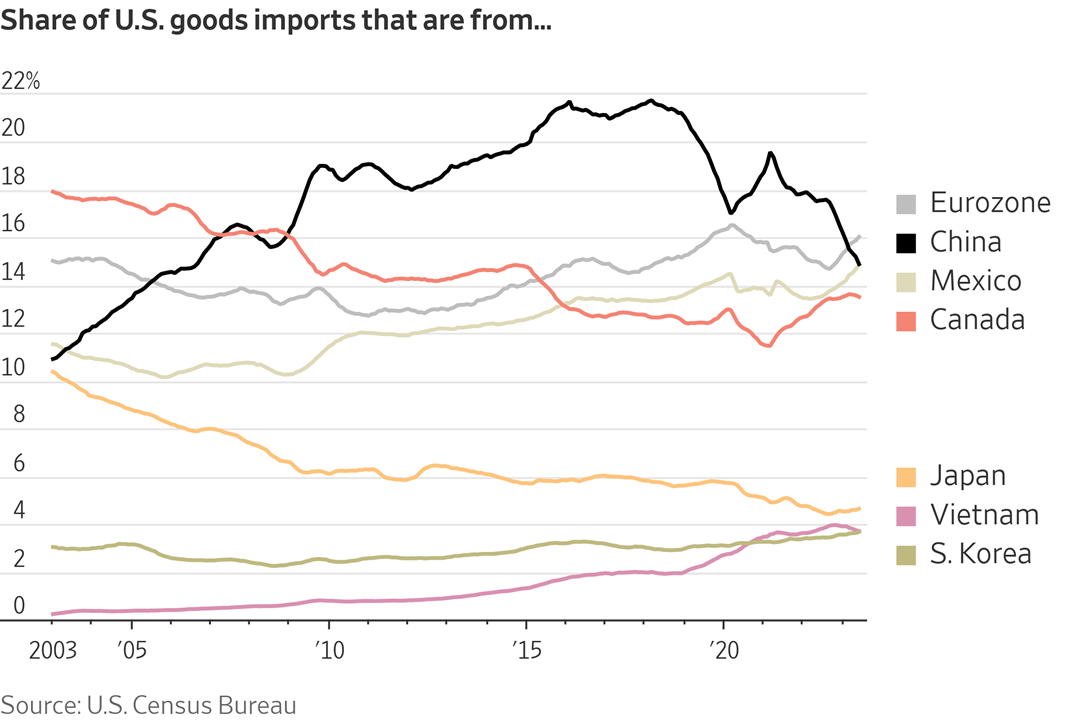
|
ENERGY & CLIMATE CHANGE |
— General Motors introduced an all-electric version of its Cadillac Escalade luxury SUV. Set to be available for purchase in late summer of the following year, the 2025 Cadillac Escalade IQ is expected to have a starting price of around $130,000. The vehicle features a prominent 55-inch LED screen on its dashboard. Notably, this model boasts a projected range of 450 miles on a single charge, surpassing any previous GM electric vehicle. This launch marks a significant step for GM as it positions Cadillac to become its luxury electric vehicle brand. Link for details.
— Blackstone Inc. raised $7.1 billion for its Blackstone Green Private Credit Fund III, exceeding its $6 billion target. This fund is dedicated to financing companies in the solar, electric car parts, and carbon emissions reduction sectors. Blackstone aims to support the shift towards lower-carbon sources in the economy. The fund reflects the company's efforts to expand its lending business amidst regulatory changes that are leading traditional banks to pull back.
Blackstone, known for buyouts, has evolved into a significant financing source, with almost a third of its $1 trillion assets allocated to credit. The fund aligns with Blackstone's initiative to invest $100 billion in companies related to alternative energy growth. The move towards green energy is a departure from rivals still investing in oil, but it could also make Blackstone a target for criticism from ESG-focused critics.
The Inflation Reduction Act (aka Climate Bill) signed by President Biden provides incentives for renewable energy companies and electric carmakers, which aligns with Blackstone's funding focus.
The company's credit arm, led by Robert Horn, aims to use its capital and resources to transform sectors of the economy and generate returns for investors. The fund's focus on renewable companies and the energy transition aligns with broader global trends towards sustainable practices.
— Wynnewood Refining Co. Challenges EPA Renewable Fuel Standard (RFS). Wynnewood Refining Co., an Oklahoma-based crude oil refinery, is contesting the Environmental Protection Agency's (EPA) rejection of its request for a small refinery exemption under the RFS program for the 2022 compliance year. The company filed a petition for review with the U.S. Court of Appeals for the Fifth Circuit, citing the Clean Air Act. The EPA denied the exemption due to the refineries' failure to prove that complying with their RFS obligations would cause disproportionate economic hardship. The RFS mandates a minimum level of renewable fuels in transportation fuel sold in the US. Wynnewood Refining Co. has previously opposed other aspects of the RFS and lost a fight against an EPA rule in July. The EPA has refrained from commenting on the matter. The company is represented by White & Case LLP.
|
LIVESTOCK, FOOD & BEVERAGE INDUSTRY |
— Vilsack presses Brazil on BSE, animal disease testing issues. USDA Secretary Tom Vilsack has sent a letter (link) to Brazilian Minister of Agriculture Carlos Fávaro regarding concerns about Brazil's animal disease testing procedures. While Brazil reported an atypical case of BSE (bovine spongiform encephalopathy, also known as mad cow disease) with confirmatory test results within 24 hours as per World Organization for Animal Health (WOAH) standards, Vilsack highlighted that the time between initial detection, sampling, and completed test results lags behind other major beef exporting countries. He praised efforts to reduce the time between sampling and reporting to the WOAH, but stressed that delays in reporting could hinder effective disease control measures. Vilsack suggested a phone discussion to address the issue and offered U.S. diagnostic laboratories for confirmatory testing, along with technical discussions on surveillance and testing procedures. Brazil had previously faced criticism for delays in confirming an atypical BSE case to the WOAH.
The U.S. Cattlemen’s Association criticized the letter, due to their opposition to Brazilian beef imports. “[T]he letter addresses only one of the concerns that the U.S. cattle and beef industry brought forward,” USCA president Justin Tupper said in a statement. “USCA remains adamant that the U.S. should immediately halt any further Brazilian beef imports until the country completely removes from its supply chain the practice of forced labor, ends the illegal deforestation of the Amazon rainforest for livestock production, and eliminates the threat of foot-and-mouth disease.”
— Analysts are warning of heightened volatility in global food prices due to a convergence of unprecedented threats, the New York Times reports (link). A combination of factors, including extreme weather, Russia's interference with grain supplies in Ukraine, and protectionist trade policies, has made food supplies more vulnerable to disruptions. This emerging trend of volatility is being dubbed the "new normal," characterized by uncertainty in commodity and food prices. Russia's withdrawal from a grain deal with Ukraine and droughts in Asian food-exporting nations have impacted harvests and led to supply shortages. Governments banning critical food exports have further disrupted markets, contributing to rising prices. Labor costs and increased food producer pricing strategies have also driven up consumer food prices. The impact has been felt most acutely by small farmers and low-income individuals, exacerbating global hunger and food insecurity. The cumulative effect of recent shocks has left nations ill-equipped to manage potential future crises.
|
HEALTH UPDATE |
— Despite the recent uptick in Covid cases, experts suggest waiting on a vaccine booster until a new formulation is available in the fall.
— Recent research suggests that taking as few as 4,000 steps per day can yield significant health advantages. While the traditional goal has been 10,000 daily steps, a study reveals that the risk of mortality starts decreasing at approximately 4,000 steps. For individuals under the age of 60, the most substantial benefits are observed within the range of 7,000 to 13,000 steps per day. The key takeaway is that striving to accumulate more steps, based on one's capacity, can contribute to improved health outcomes. Link for more.
|
POLITICS & ELECTIONS |
— Presidential candidates will flock to the 11-day Iowa State Fair, one of America's oldest and biggest agricultural and industrial expositions. Link for details.
|
CONGRESS |
— Sen. Dianne Feinstein (D-Calif.), 90, was briefly hospitalized after falling in her home in San Francisco. She returned to her residence after an examination showed no serious injuries, her spokesman said. The senator tripped over a chair in her kitchen, according to her office. She was admitted briefly to the medical center at the University of California, San Francisco, “as a precaution,” Adam Russell, her spokesman, said on Wednesday. He added that she had remained there for an hour or two until doctors determined that her scans were clear.x
|
OTHER ITEMS OF NOTE |
— North Korean leader Kim Jong Un has given a strong directive to his military commanders to be fully prepared for war, as reported by the state media. This statement is more aggressive than usual and includes instructions for boosting weapons production and expanding military exercises. This announcement followed the replacement of his highest-ranking general. State media also released images showing Kim Jong Un pointing to a map of South Korea during this development.
|
KEY LINKS |
WASDE | Crop Production | USDA weekly reports | Crop Progress | Food prices | Farm income | Export Sales weekly | ERP dashboard | California phase-out of gas-powered vehicles | RFS | IRA: Biofuels | IRA: Ag | Student loan forgiveness | Russia/Ukraine war, lessons learned | Russia/Ukraine war timeline | Election predictions: Split-ticket | Congress to-do list | SCOTUS on WOTUS | SCOTUS on Prop 12 pork | New farm bill primer | China outlook | Omnibus spending package | Gov’t payments to farmers by program | Farmer working capital | USDA ag outlook forum | Debt-limit/budget package |






